|
|
|
Sort Order |
|
|
|
Items / Page
|
|
|
|
|
|
|
| Srl | Item |
| 1 |
ID:
068929
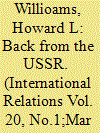

|
|
|
| 2 |
ID:
167060
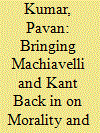

|
|
|
|
|
| Summary/Abstract |
This article is an attempt to understand the idea of morality in two of the most influential philosophers Niccolo Machiavelli (The Prince and Discourses) and Immanuel Kant (Perpetual Peace and Metaphysical Elements of Justice). Machiavelli and Kant are chosen because both of them are the most cherished philosophers in their fields. Machiavelli’s name is associated with realism, and he got a bad name because of his alleged cruel advice to maintain the state. His name is equalled with cunningness, murder, treachery. On the other hand, Kant is the founding figure of idealism in politics. His focus on categorical imperative and human capabilities to attain the higher moral goals made him one of the most well-known philosophers on idealism. To understand the ethical problems of the day emphasis is given to the classic writings of scholars who have written extensively on morality, justice, state, power, human rights and individual freedom. This article is an attempt to answer the following questions: Is the state in itself a highest moral actor? Can there be an individual morality above the state? What should be the yardstick to judge an act—the act in itself or the outcome of the act? What are the duties and rights of the individual in domestic society and can there be a similarity of morality at the level of political leaders in international politics? The paper argues that both Machiavelli and Kant were dealing with different contexts and societies, and morality for them had different meanings. However, the end justifies the means dictum is not the right way to understand Machiavelli on morality.
|
|
|
|
|
|
|
|
|
|
|
|
|
|
|
|
| 3 |
ID:
108019
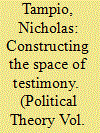

|
|
|
|
|
| Publication |
2011.
|
| Summary/Abstract |
How do we conceptualize distinctions between religious-political territories in the contemporary world when old categories-such as Islam and the West, or dar al-Islam and dar al-harb-precipitate misunderstandings and conflicts? In this essay, I consider Tariq Ramadan's argument that Muslims must enact an intellectual transformation along the lines of Kant's Copernican revolution and thence create concepts-such as the space of testimony (dar al-shahada)-to facilitate interreligious dialogue, cooperation, and respectful contestation. The essay aims to illuminate the nature of Ramadan's political theory and dispel the claim that he is a Muslim Martin Luther; to imagine the contours of a future political-intellectual movement that integrates elements of the European Enlightenment and the Arab Nahda; and to envision how Muslim and non-Muslim political theorists may combat political Manichaeanism without denying the reality and importance of contending ethical visions and political identities.
|
|
|
|
|
|
|
|
|
|
|
|
|
|
|
|
| 4 |
ID:
087476


|
|
|
|
|
| Publication |
2009.
|
| Summary/Abstract |
This article examines various implications of democratic peace theory in both the contemporary era and in Greece during the Peloponnesian War era. It considers the evidence for various hypotheses in both contexts, to understand why those hypotheses - especially those concerning institutions - find much better support in the contemporary era. It also addresses the causes and possible consequences of expansionist policies, including hypotheses that democracies are more effective war-fighters and thus better able to pursue successful expansion by military means.
|
|
|
|
|
|
|
|
|
|
|
|
|
|
|
|
| 5 |
ID:
153671


|
|
|
|
|
| Summary/Abstract |
This article explores three key arguments: Firstly, it seeks to demonstrate the contradictions and limits within Kantian hospitality, and its links to colonialism and practices of racialisation. The acclaimed universalism of Kant’s law of hospitality forecloses a discussion of its dualism, and erases the historical, racist context in which it was conceived. The prioritization of concept over conception allows Kant’s theory on race to be obscured from official discourse and framing of policies while it still courses through inherited perceptions and theories. Secondly, in making my case, I will be applying the notion of coloniality, coined by Aníbal Quijano and later developed by Walter Mignolo, to the existing but small body of critical discourse on Kant and race. Debates initiated on the peripheries of philosophy, law and anthropology in the 1990s have led the way in this regard. However, given the time that has elapsed, it is notable that their work has received little scrutiny in political theory and International Relations theory, and thus warrants renewed attention. I argue that the notion of coloniality provides a useful lens through which to do so, and a vehicle through which to apply those excavations to a contemporary context. Finally, the article explores the extent to which Kantian thought constitutes ‘modern’ cosmopolitanism, and draws attention to the inadvertently complicit role of second-generation cosmopolitans in the erasure of race from the study of Kant. The relationship between the collective erasure of race and racism in academia and European practice towards refugees and immigrants is briefly considered.
|
|
|
|
|
|
|
|
|
|
|
|
|
|
|
|
| 6 |
ID:
103755
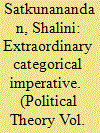

|
|
|
|
|
| Publication |
2011.
|
| Summary/Abstract |
Many political theorists assume that Kant's categorical imperative can only present itself to politics epistemologically-that is, as a test or procedure for acquiring more certain knowledge of duties. This study retrieves the ontological aspect of the categorical imperative by showing that the Groundwork of the Metaphysic of Morals is a conversion narrative. In the Groundwork Kant describes a transformative encounter with the categorical imperative as a principle that discloses our (ordinarily concealed) ontological condition. This encounter opens a new mode of being characterized by the feeling of awe. In its ontological aspect, the categorical imperative discloses human freedom and demands an unflagging thoughtfulness, but offers no material guidance about duties. When understood in both its ontological and epistemological aspects, the categorical imperative offers a rich portrait of human responsibility and can help illuminate the ethical stance appropriate to politics without becoming a standard to be imposed upon politics.
|
|
|
|
|
|
|
|
|
|
|
|
|
|
|
|
| 7 |
ID:
113884
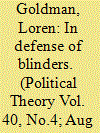

|
|
|
|
|
| Publication |
2012.
|
| Summary/Abstract |
Kant's progressive philosophy of history is an integral aspect of his critical system, yet it is often ignored or even treated as an embarrassment by contemporary scholars. In this article, I defend Kant and argue for the continuing relevance of his regulative assumption of historical progress. I suggest, furthermore, that the first-person stance of practical belief exemplified in Kant's conception of hope offers new resources for thinking about the relationship between the ideal and the real in political theory.
|
|
|
|
|
|
|
|
|
|
|
|
|
|
|
|
| 8 |
ID:
155784
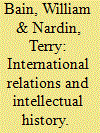

|
|
|
|
|
| Summary/Abstract |
The history of international thought has traditionally focused on a limited number of canonical texts. Such an approach now seems both naive and parochial. International Relations scholars often read their own ideas into these texts instead of getting ideas from them – ideas that if properly understood have the potential to undermine theirs. By ignoring non-canonical texts, we overlook resources that are not only necessary to establish the historical contexts of canonical writings but that can also help theorists of International Relations to understand their subject better. Judgements of what is and is not canonical are in any case themselves context-bound and contestable. Intellectual history can help us understand how the International Relations canon was constructed and for what purposes. It can also counter the abstractions of theory by reminding us not only that theories are abstractions from the activities of people living in particular times and places but also that our own theories are embedded in historicity. In these and other ways, paying attention to intellectual history expands the repertoire of ideas on which International Relations theorists can draw and against which they can measure their conclusions. The articles in this issue illustrate these points in relation to a wide range of texts and contexts. They suggest that whether one approaches international relations from the angle of description, explanation, policy or ethics, knowing how past thinkers have understood the subject can lead to better informed and more robust scholarship.
|
|
|
|
|
|
|
|
|
|
|
|
|
|
|
|
| 9 |
ID:
046201
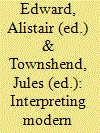

|
|
|
|
|
| Publication |
New York, Palgrave Macmillan, 2002.
|
| Description |
viii, 241p.
|
| Standard Number |
0333772415
|
|
|
|
|
|
|
|
|
|
|
|
Copies: C:1/I:0,R:0,Q:0
Circulation
| Accession# | Call# | Current Location | Status | Policy | Location |
| 046116 | 320.01/EDW 046116 | Main | On Shelf | General | |
|
|
|
|
| 10 |
ID:
155792
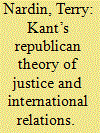

|
|
|
|
|
| Summary/Abstract |
Kant’s primary concern in writing on international relations is how to achieve ‘justice’ (Recht) between states. This means that instead of reading Kant as a theorist of peace or world government, as IR theorists have usually done, he is better read as a theorist international justice. His view of justice, which identifies it with a legal order that respects freedom as independence or nondomination, is broadly republican. But he equivocates on the possibility of justice at the international level, and this narrows what is usually seen as a wide gap between Kant’s thought and political realism. The paradox his uncertainty reveals is that it is wrong for states to remain in a lawless condition yet impossible for them to escape it so long as they remain independent. An international order cannot generate genuine law because there are no institutions to make, interpret, or enforce it. This means that states are entitled to determine their own foreign affairs. The gap between sovereignty and justice cannot be closed so long as these ideas are defined as they are within the state. The problem is not that a full, secure, and nonvoluntary system of justice that preserves the sovereignty of states is contingently unlikely. It is conceptually impossible. This conclusion poses a challenge to current theories of global justice.
|
|
|
|
|
|
|
|
|
|
|
|
|
|
|
|
| 11 |
ID:
108475
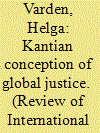

|
|
|
|
|
| Publication |
2011.
|
| Summary/Abstract |
I start this article by addressing Kant's question why rightful interactions require both domestic public authorities (or states) and a global public authority? Of central importance are two issues: first, the identification of problems insoluble without public authorities, and second, why a domestic public monopoly on coercion can be rightfully established and maintained by coercive means while a global public monopoly on coercion cannot be established once and for all. In the second part of the article, I address the nature of the institutional structure of individual states and of the global authority. Crucial here, I argue, is Kant's distinction between private and public right. Private right concerns rightful relations between individual legal subjects, where public right concerns legal subjects' claims on their public institutions. I propose that the distinction between private and public right should be central to liberal critiques of current legal and political developments in the global sphere.
|
|
|
|
|
|
|
|
|
|
|
|
|
|
|
|
| 12 |
ID:
145623
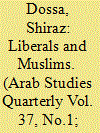

|
|
|
|
|
| Summary/Abstract |
The liberal claim to decency is flimsy. In fact, the liberal norm is indecency. The Muslim case is symptomatic of this reality. The suffering of Muslims is extensive in liberal locales. The threat to Muslim security is intrinsic in liberal theory. It is the liberal genre of exclusion. In this article, I unravel anti-Muslim antipathy in Kant, Mill, and Montesquieu (KMM). I dissect their specious claims about the Muslims and the Orient. I stress KMM's formative influence on liberal academe. I conclude with the criticism of liberal Jewish attacks on Muslims/Arabs/Palestinians.
|
|
|
|
|
|
|
|
|
|
|
|
|
|
|
|
| 13 |
ID:
109862
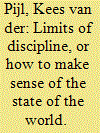

|
|
|
| 14 |
ID:
164837
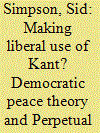

|
|
|
|
|
| Summary/Abstract |
The work of Immanuel Kant has been foundational in modern democratic peace theory. His essay Toward Perpetual Peace gives three prescriptions for attaining peace between democracies: republican institutions, a pacific union between states, and an ethos of universal hospitality. Contemporary democratic peace theory, however, has warped the Kantian framework from which it draws inspiration: the third prescription has been gradually substituted for commerce and trade. I argue that this change in emphasis produces tensions between Perpetual Peace and the body of democratic peace theory literature it spawned. Moreover, I contend that a look back at Kant’s essay sheds light on why this transformation occurred. Finally, I use this new look back at Perpetual Peace to reformulate the relationship between peace, democracy, and commerce so as to offer a new perspective on the democratic peace theory/capitalist peace theory debate.
|
|
|
|
|
|
|
|
|
|
|
|
|
|
|
|
| 15 |
ID:
091914
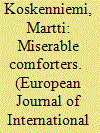

|
|
|
|
|
| Publication |
2009.
|
| Summary/Abstract |
In his 'Perpetual Peace', Kant indicts the natural law tradition (Grotius, Pufendorf, Vattel) as 'miserable comforters' whose principles and doctrines 'cannot have the slightest legal force'. The indictment emerges from Kant's critique of natural law in both its empirical and rationalist variants as unable to uphold a really 'binding' notion of cosmopolitan legality. Since the early 1990s a new literature has emerged in the International Relations field that speaks about the effectiveness and legitimacy of international law as a form of supranational 'governance'. This article argues that that literature raises precisely the same problems that Kant detected in early modern natural law. Like the latter, this literature is best seen as an attempt to appropriate the voice of international legality to a fully instrumentalist discipline dedicated to serving the interests of power
|
|
|
|
|
|
|
|
|
|
|
|
|
|
|
|
| 16 |
ID:
151570
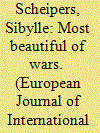

|
|
|
|
|
| Summary/Abstract |
Carl von Clausewitz was both an avid analyst of small wars and people’s war and, during the wars of liberation, a practitioner of small war. While Clausewitz scholars have increasingly recognised the centrality of small wars for Clausewitz’s thought, the sources and inspirations of his writings on small wars have remained understudied. This article contextualises Clausewitz’s thought on small wars and people’s war in the tradition of German philosophical and aesthetic discourses around 1800. It shows how Clausewitz developed core concepts such as the integration of passion and reason and the idea of war in its ‘absolute perfection’ as a regulative ideal in the framework of his works on small wars and people’s war. Contextualising Clausewitz inevitably distances him from the twenty-first-century strategic context, but, as this article shows, it can help us to ask pertinent questions about the configuration of society, the armed forces and the government in today’s Western states.
|
|
|
|
|
|
|
|
|
|
|
|
|
|
|
|
| 17 |
ID:
118952
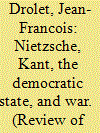

|
|
|
|
|
| Publication |
2013.
|
| Summary/Abstract |
This article offers a reconstruction of Nietzsche's critique of Kant's scheme for perpetual peace distilled from his life-long confrontation with Kant's critical philosophy. Through this reading strategy, it sheds light on Nietzsche's controversial and yet surprisingly under-researched reflections on the problem of conflict and war in human affairs. Although Nietzsche embraced many of the basic premises of Kant's critical philosophical project, he considered the ethico-political conclusions Kant drew from these to be both irrational and nihilistic. From Nietzsche's perspective, Kant's thoughts on politics and International Relations rest on a fundamental misunderstanding of the phenomena of agency, statehood, and war that elides both the tragic relationship between politics and culture, and the violence which Nietzsche believes to be latent in all attempts at reconciling individual with collective autonomy. According to Nietzsche, Kant's influential association between liberal republicanism, freedom, and peace contributed unwittingly in ushering in the cult of the nation-state, which Nietzsche warned would engulf Europe into a wholly new kind of organised violence in the coming decades. Although clearly not without their uncritical assumptions and hubristic tendencies, Nietzsche's reflections on war and peace draw attention to some of the more insidious risks and difficulties attending liberal attempts at accommodating cosmopolitan values and principles within the framework of the modern nation state.
|
|
|
|
|
|
|
|
|
|
|
|
|
|
|
|
| 18 |
ID:
107949
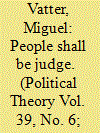

|
|
|
|
|
| Publication |
2011.
|
| Summary/Abstract |
This essay offers an interpretation of Kant's republicanism in light of the problem of political judgment. Kant is sometimes thought to base his conception of law on an idea of sovereignty drawn from Hobbes and Rousseau, which would leave little room for popular contestation of the state. In this essay, I reconstruct Kant's account of the rule of law by bringing out the importance of his theory of judgment. I argue that for Kant the civil condition is ultimately characterized by a contest between the judgment of the sovereign and the judgment of the people, which corresponds to the determinative and reflective employments of political judgment, respectively. On this view, popular sovereignty is ultimately located in the people's power to judge politically and contest publicly the state.
|
|
|
|
|
|
|
|
|
|
|
|
|
|
|
|
| 19 |
ID:
112795
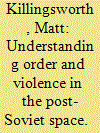

|
|
|
|
|
| Publication |
2012.
|
| Summary/Abstract |
Following the end of the Cold War, the discipline of international relations has benefited from a plethora of old, new and hybrid approaches to understanding order and violence. Yet amidst the scholarship on 'new wars', neo-medievalism and a range of alternative approaches such as human and critical security, the goal of understanding the motives, nature and limitations of contemporary uses of force remains elusive. This article attempts to shed light on this issue by reconsidering three traditions in conceptualising order and violence: the Grotian, Kantian and Clausewitzian traditions. It applies the respective emphases of each (legitimacy and law; moral imperatives; and Realpolitik) to the two Chechen wars and the 2008 Russo-Georgian war. The article demonstrates that while the prescriptive elements of the normative Grotian and Kantian traditions may well reflect the future trajectory of political violence, war continues to be fought for clear political motives relating to statehood and power. Based on the cases assessed here, the Clausewitzian tradition remains the most appropriate way to understand violent conflict in the post-Soviet space.
|
|
|
|
|
|
|
|
|
|
|
|
|
|
|
|
| 20 |
ID:
080820
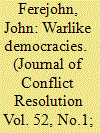

|
|
|
|
|
| Publication |
2008.
|
| Summary/Abstract |
Classical republican theories are monadic in the sense of seeing in each political regime a set of typical operating characteristics. There is disagreement as to what those characteristics are and specifically whether republican governments are more likely to be aggressive or peace loving. We group these two views as (democratic) mobilization theory versus (republican) checks theory and argue, first, that each can help us understand the finer structure of republican government; second, that they are not contradictory but can be combined in various ways in the same institutions; and third, that they offer the prospect of deepening our understanding of what is called the democratic peace proposition.
|
|
|
|
|
|
|
|
|
|
|
|
|
|
|
|
|
|
|
|
|